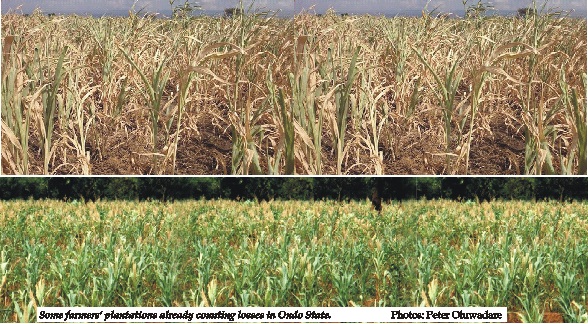Effects of Land Use Act on land tenure system
‘Land is pivotal to man’s survival. Man depends on land for food, shelter, clothing and other human needs. It is a source of economic wealth to many. The importance of land to the overall well-being of man cannot be overemphasised.’.

Prior to the promulgation of the Land Use Act of 1978, there was in existence a system of communal ownership of land in various communities in Nigeria. This means that, the ownership of land was vested in either family or the community.
This Act vested all Land compromised in the territory of each State (except land vested in the Federal government or its agencies) solely in the Governor of the State, who would hold such Land in trust for the people and would henceforth be responsible for allocation of land in all urban areas to individuals resident in the State and to organisations for residential, agricultural, commercial and other purposes while similar powers with respect to non-urban areas are conferred on Local Governments.
Section 1 provides that the Governor of each state shall hold the land comprised in such State upon trust and administer same for the use and common benefit of all Nigerians.
What private individuals have on the land is a right of occupancy see, Kachalla v. Banki. This is the greatest and highest legal interest a holder of land in a state can have Section 5(1); LUA. Ezennah v. Attah.
Section 4 preserves the application of the State Land Law except that they will continue to have effect with such modifications as would bring those Laws into conformity with the Act or its general intendment.
Section 49 precludes the courts from questioning the Governor’s power to grant right of occupancy.
Section 26 renders void any alienation of interest in land without consent.

The Land Use Act, 1978 in effect, altered the concept of land ownership tenure, which used to be in perpetuity to a period certain. In Nigeria before the Enactment of the Act, Lands ownership and possession were forever and unfettered, however the Enactment of the Land use Act took the perpetual indigenous ownership tenure away and replaced it with limited ownership tenure of a period certain.
The indigenous land ownership tenure, before the Act were such that the owners may have statutory right of occupancy granted by the then Traditional rulers, who were believed to be custodians of all the land in their kingdom to the extent of rulership.
However, the Land use Act came and vested authority over land in the Governor as Trustee, classifying land into either LEASEHOLD or FREEHOLD and ownership tenure cum possession period became limited to 99 years on the Leasehold via the certificate of occupancy, now issuable under the Governor’s hand, which is renewable at the end of the period of 99 years certain.
Lands not covered by certificate of occupancy are known as freehold lands. The main effect of the Land use Act on indigenous Land tenure is the granting of occupancy period over a period certain, after which the holder of the C of O can lose occupancy right should he failed to renew same.
It must be noted here that there is a partial surrender of ownership to land the moment you seek and obtained a C of O which by official arrangement, automatically puts such land in the LEASEHOLD category.
Although Freehold land owners are still recognized but subject to the overriding trusteeship of the State Governors.

The 1978 Land Use Act (Act) was an attempt at cultural redirections and a land tenure system paradigm shift through legislative reengineering and constitutionalisation of land tenure system.
The Nigerian Land Use Act of 1978 extinguished the existing land tenure systems by partially dissolving various indigenous land tenure systems across Nigeria and replaced them with a uniform and unitary Land Administration system across the Country. The biggest and most far-reaching effect of the Land Use Act (Land Use Law of Ondo State, 2006) is the deculturalization of the customary law ownership and administration which were essentially based on the customs and traditions of the various communities with the Chief, community or family head holding the land in trust for family or community use.
The cardinal principle of the Act is the vetting of all urban lands comprised in the territory of each State (except those vested in the Federal Government or its Agencies) solely in the Governor to hold in trust for the people and allocate to individuals and organisations for residential among other uses.
However, the power to designate any part of the State as urban lands is technically incumbent on the State. Thus, the Government of Lagos State has designated all land in Lagos as ‘urban land’.
This implies that all land in Lagos State is vested on the Governor to be hold in trust for the people of Lagos State. Under the Act, any land that is not deemed ‘urban land’ is vested in the Chairman of the Local Government to hold in trust for the people of the local government area.
The Chairman is to be assisted by a Land Allocation Advisory Committee (LAAC), which has responsibility for advising the Local Government on any matter connected with the management of land.
Consequently, alienation by assignment, mortgage, transfer of possession, sublease of a Customary Right of Occupancy is valid in the face of law only and until the consent of the Governor or of appropriate Local Government is sought and obtained. In respect of Statutory Right of Occupancy, alienation or transfer of any form of rights thereunder is only valid by the consent of the Governor.
Another innovation exhibited by the Act is that the Governor is endowed with the legal and administrative right to grant the Statutory Right of Occupancy to any person on all Lands (urban and rural) for all purposes. That grant may include easement, appurtenance and demand for rentals (at specified intervals) as well as revision of same, therewith. Sequel to these powers, the Governor also has the right to impose penal rent for breach of conditions related to subsequent transactions on allocated lands (i.e. sale in part or whole, mortgage, transfer, sublease or bequest) without the Governor’s prior approval.
Hence, the Governor reserves the right to grant Certificate of Occupancy at prescribed fees (including for unexhausted improvement) and rent on both urban and non-urban lands and application for same. This right has been digitalized in Ondo State today by the Arakunrin Akeredolu’s led government.

Land is pivotal to man’s survival. Man depends on land for food, shelter, clothing and other human needs. It is a source of economic wealth to many. The importance of land to the overall well-being of man cannot be overemphasized.
Prior to the promulgation of *Land Use Decree, 1978 (now Land Use Act, 1978)*, there are various indigenous land tenure systems in Nigeria to wit: communal land tenure system, family land tenure system and to some extent individual land tenure system.
Upon the promulgation of the Land Use Decree (now Act), it radically impacted the hitherto land tenure systems in Nigeria.

Land, though being one of the significant causes of contentions and split among nations, it is also an important asset to the development of a nation and a major contributing factor of production to the economic growth of every country. Large percentage of human activities are done on lands.
Consequently, countries across the globe have enacted various legislations to guide human activities on land and its acquisition. In Nigeria, prior to the enactment of the 1978 Land Use Act, there was the customary/indigenous land tenure systems which was grounded on the customs and traditions of a common people.
Land was completely owned by individuals, families, communities with the traditional rulers, chiefs or family heads holding the land in trust for the people and allocate a portion of the communal land to members of the family and also bearing in mind the interest of the community. The promulgation of the Land Use Act (LUA) on 29th March, 1978 has consequently abolished the mode of transfer and ownership of land in Nigeria.
Section 1 Land Use Act, provides that all land comprised in the territory of each state in the Federation are hereby vested in the Governor of that State and such land shall be held in trust and administered for the use and common benefit of all Nigerians in accordance with the provisions of this Act.
Similar powers with respect to non-urban areas are conferred on Local Government. A local government may grant a customary right of occupancy to any person or organisation over non-urban land.
One of the views expressed as to the purpose of the Act is that it seeks to prevent unlimited rights and interests of Nigerians in lands and substituted with limited rights and control of use of lands by the governors and local government authorities (Obaseki JSC).
The preamble of the Act seems to align with the thought of General Olusegun Obasanjo in a broadcast where he stated that the purpose of the Act was to make land available to all individuals, corporate bodies, government and institutions.
On the effect of the Act on indigenous and customary ownership of Land, Section 29(3) provides for the compensation payable to holder of customary right of occupancy in case of land acquisition by a government, “If the holder or the occupier entitled to compensation under this section is a community the Governor may direct that any compensation payable to it shall be paid to the community; or to the chief or leader of the community to be disposed of by him for the benefit of the community in accordance with the applicable customary law; or into some fund specified by the Governor for the purpose of being utilised or applied for the benefit of the community.
Section 34(2) LUA still preserves the interest of indigenous land owners who have acquired the land before the commencement of the Act but with modifications.
Where in respect of land in an urban area, where the land is developed the land shall continue to be held by the person in whom it was vested immediately before the commencement of the Act as if the holder of the land was the holder of a statutory right of occupancy issued by the Governor. This means that the person is entitled to a Statutory Right of Occupancy.

The Land Use Act, 1978 has both positive and negative impacts on Nigeria land tenure system. The negative impact of the Land Use Act, 1978 on the indigenous land tenure system in Nigeria, cannot be over-emphasised.
First, the transfer of allodial title to the Governor of the State. The act altered the existing land laws by removing individuals and communities from the trusteeship of land and replaced them with the state Governors. With some Governors’ recorded to have abused and still abusing this power.
In addition, power to revoke the right to occupancy. The indigenous land owners are at the mercy of the Government who can acquire their land at any time on the ground of “overriding public interest” through revocation of right of occupancy or otherwise, as the case may be.
It is imperative I mention that in the light of civilization and modern trends of the 21st century way of life, it is necessary that the Land Use Act, 1978 be reviewed.

Before the enactment of the Land Use Act, there was some forms of recognized indigenous land tenure system in Nigeria Viz: acquisition of land by inheritance, acquisition via first settlement (either by way of conquest or deforestation of virgin land), giving out lands as gift (s), communal land holding, leasehold, freehold which accrued to individual person or some group of persons.
However, with the promulgation of the Land Use Act in 1978, the control and administration of all lands now becomes the exclusive preserve of the Governor who holds the land in trust for the people in line with Section 1 of the Land Use Act, 1978 which provides: “Subject to the provisions of this Act, all land comprised in the territory of each State in the Federation are hereby vested in the Governor of that State and such land shall be held in trust and administered for the use and common benefit of all Nigerians in accordance with the provisions of this Act”.
Section 2(1)(a) of the Land Use Act provides: “all land in urban areas shall be under the control and management of the Governor of each State” while Section 2(1)(b) of the Land Use Act provides: all other land shall, subject to this Act, be under the control and management of the Local Government, within the area of jurisdiction of which the land is situated.
The inference to be drawn from the provisions cited above is that: all land in urban areas shall be under the control and management of the Governor of each State while all lands in rural areas shall be under the control and management of local government within that jurisdiction.
The Land Use Act, 1978 also empowers the Governor of each State (a) to grant statutory rights of occupancy to any person for all purposes; (b) to grant easements appurtenant to statutory rights of occupancy; (c)to demand rental for any such land granted to any person, (d) to revise the said rental;(e) to impose a penal rent for breach of any covenant in a certificate of occupancy requiring the holder to develop or effect improvement s on the land the subject of the certificate of occupancy and to revise such penal rent as provided in section 19 of this Act; (f) to impose a penal rent for a breach of any condition, express or implied, which precludes the holder of statutory right of occupancy from alienating the right of or any part thereof by sale, mortgage, transfer or possession, sub-lease or request without the prior consent of the Governor; (g)to waive, wholly or partially, except as otherwise prescribed; all or any of the covenant or conditions of which a statutory right of occupancy is subject where, owing to special circumstances, compliance therewith would be impossible or great hardship would be imposed upon the holder; (h) to extend except as otherwise prescribed, the time to the holder of a statutory right for performing any conditions of the right of occupancy upon such terms and conditions as he may think fit.










Unraveling Nigeria’s Customary Land Tenure Systems: a Comprehensive Overview – Rofiat Popoola - LawGlobal Hub
19th Oct 2023[…] “Effects of Land Use Act on land tenure system | The Hope Newspaper” https://www.thehopenewspaper.com/effects-of-land-use-act-on-land-tenure-system/ […]